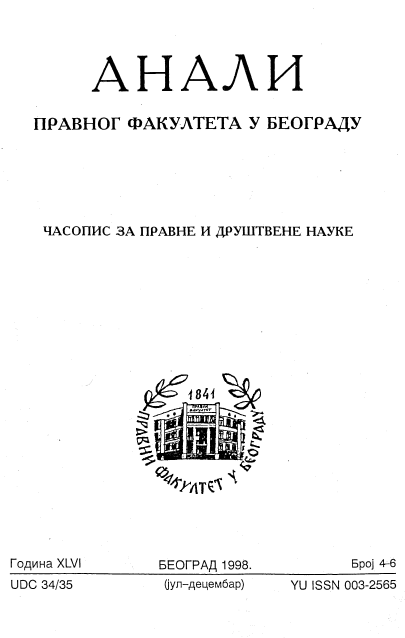САМОВОЉНО ЛЕЧЕЊЕ БОЛЕСНИКА И ЊЕГОВА ПРАВНА ПРИРОДА
THE ARBITRARY TREATMENT OF THE PATIENT AND ITS LEGAL NATURE
Author(s): Jakov RadišićSubject(s): Human Rights and Humanitarian Law
Published by: Правни факултет Универзитета у Београду
Keywords: Medical Secret; Duty to Keep a Medical Secret; The General Right of a Person;Liability for damage. – Nuclear damage. – Absolute liability. – Relative liability. – Presumption of causation. – Limitation of indemnification.;
Summary/Abstract: The author sets out from the premise that the arbitrary treatment of a patient is a form of illegal treatment. One may speak of arbitrary treatment in the case when the patient is not asked for his consent to undergo a certain medical intervention, when he refuses to give his consent for the intervention or when his consent is not legally valid. It is possible to present arbitrary treatment as a social phenomenon and as a legal problem only through clarifying the consent for treatment and the conditions for its validity. The first part of the paper is devoted to this issue. In the second part of his paper, the author discusses the different academic iiltcrprclations regarding the legal nature of arbitrary treatment. He lays particular emphasis on the existence of different views about whether the prohibition of arbitrary treatment is solely to protect the patient's freedom to decide on his own physical integrity or physical integrity itself.. The former viewpoint is upheld in the Criminal Code of Austria while the latter is to be found in the practice of the German and Swiss courts. However, these differences in criminal law have had no effect on civil liability in these countries because Austrian civil courts qualify the arbitrary treatment of patients as bodily injury. This means that the notions of bodily injury in criminal and civil law are different. Arbitrary curative treatment of the body of a patient is and remains legally impermissible even in the case when the desired aim is achieved. Therefore, there is room for criminal responsibility' because of the criminal act or misdemeanour. However, liability in tort for this act is governed by another logic because it presumes the existence of loss. If there is no loss, then the right to compensation is excluded. If the court sentence would allow satisfaction (i.c. a sum of money) to the patient merely' because of the doctor's disregard for the patient's right to dispose of his own body this would not be in keeping with ethics. Furthermore, neither is the legal foundation for such a measure within reach.
Journal: Анали Правног факултета у Београду
- Issue Year: 46/1998
- Issue No: 4-6
- Page Range: 365-381
- Page Count: 17
- Language: Serbian

